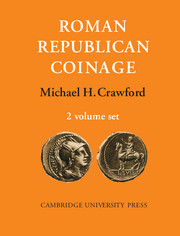Book contents
- Frontmatter
- Contents
- VOLUME I
- INTRODUCTION
- CATALOGUE
- VOLUME II
- misc-frontmatter
- 1 Technique and Technology
- 2 Weight Standards
- 3 Monetary Magistrates
- 4 Special Formulae
- 5 Administration and Control
- 6 Roman Units of Reckoning Under the Republic
- 7 Coinage and Finance
- 8 Careers of the Moneyers
- 9 Types and Legends
- 10 Art and Coinage
- Plates
- Indices
- Plate section
6 - Roman Units of Reckoning Under the Republic
from VOLUME II
Published online by Cambridge University Press: 07 October 2011
- Frontmatter
- Contents
- VOLUME I
- INTRODUCTION
- CATALOGUE
- VOLUME II
- misc-frontmatter
- 1 Technique and Technology
- 2 Weight Standards
- 3 Monetary Magistrates
- 4 Special Formulae
- 5 Administration and Control
- 6 Roman Units of Reckoning Under the Republic
- 7 Coinage and Finance
- 8 Careers of the Moneyers
- 9 Types and Legends
- 10 Art and Coinage
- Plates
- Indices
- Plate section
Summary
SESTERTIUS
In the historical period the Romans expressed a large number of assessments of value, from property qualifications to fines, in monetary terms; since these assessments of value were often politically important, it is clearly desirable to know what these monetary terms meant and whether they varied from one period to another. Confusion was sown, uncharacteristically, by Mommsen; the reality is in my view very simple and can be expressed in four propositions. The Romans officially reckoned in asses from earliest times down to the point at which the denarius was revalued at sixteen asses instead of ten asses; thereafter they officially reckoned in sestertii; all state assessments hitherto expressed as so many asses were now converted to the same number of sestertii; all state payments hitherto computed in asses were hereafter made in such a way that the same amount of silver was paid out. Individual practice of course did not always conform to the first two propositions, but this does not affect their general validity; the official unit of reckoning in England now is the pound, despite the fact that surgeons express their prices in guineas and my College expresses the cost of wine consumed in pence; since the last two propositions related only to matters of official concern, there are no exceptions.
The first problem to be considered is the expression in sestertii of assessments earlier expressed in asses; the evidence is best displayed in tabular form (see Table XLVIII, where the figures in denarii and asses record the state of affairs before c. 141, the figures in sestertii the state of affairs thereafter).
It seems to me far more plausible to assume that the same figure was transferred from assessments in asses to assessments in sestertii than to argue, with Mommsen, that the sestertius (weighing a scruple of silver) and the libral as were originally equivalent and that figures could be expressed indifferendy in one or the other; that figures so expressed were perpetuated unchanged when with the creation of the denarius system the sestertius was fixed at 2.5 asses; and that whenever figures involve the equivalence 2.5 asses = 1 sestertius = 1/4 denarius (an equivalence which came in with the denarius system) they must have been fixed after the as ceased to be libral.
- Type
- Chapter
- Information
- Roman Republican Coinage , pp. 621 - 632Publisher: Cambridge University PressPrint publication year: 1975



